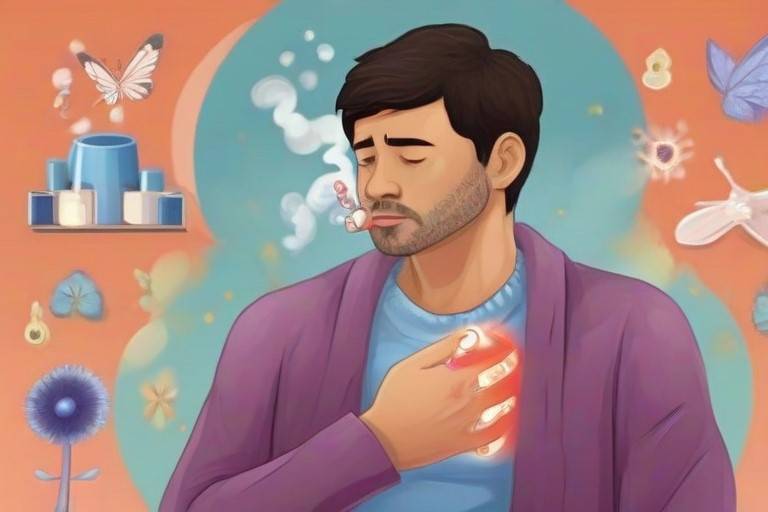Unusual Asthma Symptoms Decoded: Unmasking Surprising Red Flag
Asthma affects over 25 million Americans. The wheezing, coughing, and chest tightness are familiar foes for most. However, unusual asthma symptoms can sometimes be the first confusing sign that you have this chronic respiratory condition. Read on to learn more about the top 5 sneaky unusual signs of asthma you must never ignore. Unusual Asthma Symptoms may hide in plain sight, and recognizing them early is crucial for effective management and improved quality of life.
Key Takeaways on Unusual Asthma Symptoms

| Unusual Symptom | Description |
| Chronic Cough | A cough that lasts more than 3 weeks could indicate asthma. This is one of the most common unusual asthma symptoms. |
| Shortness of Breath | Trouble catching your breath, especially when exercising, may point to asthma. |
| Tight Throat | Feeling like your throat is closing or it’s hard to swallow can occur with asthma. |
| Heartburn | Many people mistake asthma for acid reflux due to this shared unusual symptom. |
| Fatigue | Poor asthma control leads to poor sleep, which causes low energy. |
What Counts as an Unusual Asthma Symptom?

When we think of classic asthma signs, coughing, wheezing, and chest tightness usually come to mind first. Yet asthma can manifest in surprising ways that are less well-known.
Some of the most common, tricky, unusual asthma symptoms include:
- Chronic cough
- Shortness of breath
- Tight throat
- Troublesome heartburn
- Unexplained fatigue
While these may seem unconnected to breathing issues, they offer important clues. Recognizing them can lead to faster diagnosis and treatment of these subtle, unusual asthma symptoms.
#1 – Chronic Cough
A cough that lasts longer than 3 weeks is considered a chronic cough. This persistent hack is among the most frequently reported non-typical unusual asthma symptoms.
In a study published in the Journal of Asthma, a chronic cough was the main sneaky symptom that led to an asthma diagnosis in 25% of participants.
Unlike a temporary cough from a cold that goes away after a few days, chronic coughs linger long after you would expect. They may keep you or your family up at night.
Some quick facts on chronic cough and asthma:
- Usually dry and non-productive
- It can occur alongside wheezing or independently
- Often worse at night or with activity
- Using rescue inhalers only temporarily relieves it
See your doctor if you have a stubborn, lingering cough for 3 weeks or more to rule out asthma as the cause of this subtle, unusual symptom. Treating any underlying inflammation can help mute chronic coughs long-term.
#2 – Shortness of Breath
Trouble catching your breath is commonly linked to asthma. Medical literature lists it as one of the top sneaky, unusual asthma symptom presentations.
While most associate shortness of breath with exercise, it can come on randomly, too. You may feel winded doing simple daily tasks or have Difficulty breathing deeply.
Studies show over 6% of elite college athletes have exercise-induced asthma. Their fitness levels disguise breathing Difficulty until it hinders performance.
Athletes and non-athletes alike under-recognize asthma as the cause of unexplained shortness of breath. Getting tested allows for proper care of this subtle, unusual symptom.
Signs your shortness of breath may be asthma-related and include
- Feeling winded during cardio exercise, Breathlessness when exposed to cold air, Chest tightness, or rapid breathing along with it
- Using an inhaler temporarily provides relief
#3 – Tight Throat
A tight or closing throat ranks high among strange asthma manifestations. This uncomfortable feeling occurs due to inflammation narrowing the airways.
Some call it feeling like something is stuck in their throat when nothing is visible. It may also hurt or be hard to swallow.
A European Respiratory Society study found that 17% of asthma patients experience throat tightness as a sneaky, unusual symptom. It tends to flare up most with stress and seasonal allergies.
While easy to brush off as anxiety or allergies, rule out asthma first. Tell your doctor if you have a frequent sensation of a lump in the throat
- , Hoarse voice
- , Difficulty swallowing
- A choking feeling around the neck area
Properly treating any asthma component can ease throat tightness as a subtle, unusual symptom.
#4 – Troublesome Heartburn
Gastroesophageal reflux disease (GERD) and asthma surprisingly tend to co-occur at higher rates. Estimates suggest up to 80% of asthmatics also have acid reflux symptoms.
Heartburn results when stomach acid flows back up into the oesophagus. This ignites a burning fire behind the breastbone.
Research into this asthma-GERD link remains ongoing, but shows reflux can aggravate lung inflammation. Pressure from coughing may promote acid leaks.
Pay attention if your heartburn is:
- Frequent
- Won’t respond to antacids
- Accompanied by hoarse voice/sore throat
- Worsens during asthma attacks
Prompt asthma treatment may help resolve reflux triggered by this sneaky, unusual symptom. And managing GERD can lead to better long-term control of asthma.
#5 – Fatigue
Feeling unexpectedly wiped out raises an asthma red flag. Breathing issues play a role if you sleep well but still have no energy.
Poorly controlled asthma prevents reaching restorative deep sleep. Tossing and turning from coughs or wheezing robs you of quality rest.
Research confirms patients with uncontrolled asthma and fatigue experience:
- More insomnia symptoms
- Daytime sleepiness
- Lower sleep efficiency
- Decreased energy levels
Don’t ignore ongoing, unexplained exhaustion, assuming it’s stress or ageing. Seek medical advice to discover if asthma causing fatigue is the real culprit.
Proper management can help you reclaim refreshing sleep and restore vitality from this draining, unusual symptom.
When to Seek Help for Unusual Asthma Symptoms

Unusual asthma symptoms can make diagnosis tricky. Patients showing non-classic symptoms often live with uncontrolled disease for years.
Don’t dismiss subtle atypical patterns, assuming it’s something else less serious. Check in with your doctor if you have the following:
- A chronic cough lasting over 3 weeks
- Increased shortness of breath
- Frequent throat tightness
- Heartburn more than twice a week
- Low energy levels impacting work/relationships
Early intervention lets you control asthma before it controls you. Better disease management also lowers the risks of complications from sneaky, unusual symptoms.
Get tested for asthma today if these less common clues ring any bells. Consistent care is critical, even when symptoms seem odd or unpredictable at first glance.
Conclusion about unusual asthma symptoms
Asthma’s reach extends far beyond just the lungs. Its impact shows up in many unexpected ways that affect quality of life. You know your body best. Pay attention when something feels off or limiting. Don’t downplay nagging unusual symptoms, assuming they’re typical signs of aging.
Seek trusted medical guidance for lasting issues like chronic cough or fatigue. Getting to the root cause can unlock the proper treatment and relief. Addressing asthma head-on, even with confusing initial symptoms, leads to hope. Taking steps to manage this condition properly makes breathing – and thriving – possible again.
FAQs about unusual asthma symptoms
Here are the common frequently asked questions about unusual asthma symptoms and the best answers for them.
When is asthma worse?
Asthma symptoms, like coughing or wheezing, tend to flare up at night or early morning when cortisol levels dip. Triggers like allergens, irritants, weather changes, infections, and stress can also worsen asthma. Pay more attention to when you use your rescue inhaler to identify your unique asthma triggers.
What are the symptoms of stress asthma?
Stress aggravates asthma by causing more inflammation. Common stress asthma signs include tightness in the chest, shortness of breath, coughing, and needing to use rescue inhalers more often. Managing stress with relaxation techniques helps minimize flare-ups.
What improves asthma?
Controlling asthma improves the quality of life. Seeing your doctor regularly to monitor symptoms and adjust meds helps. Avoiding triggers, taking prescribed meds correctly, maintaining a healthy weight, staying active, managing stress, and not smoking also keep asthma under better control.
What is an uncommon symptom of asthma?
Some weird early signs of asthma include chronic cough, congestion, sinus troubles, symptoms that mimic heartburn, fatigue, low energy, and throat tightness or Difficulty swallowing. Learning to recognize subtle clues leads to earlier diagnosis.
What are mild asthma attacks?
Mild but aggravating asthma attacks may involve tightness in the chest, shortness of breath, light wheezing, or using quick-relief inhalers more often without complete relief of symptoms. Changes usually happen slowly over hours or days versus intense, sudden attacks. Still, take symptoms seriously and adjust meds.
Why am I suddenly getting asthma?
New adult-onset asthma can result from pneumonia, allergies, smoking, sinus problems, medications, or significant stress. Testing for the underlying cause is vital, as is starting controlled meds to reduce airway inflammation if asthma is confirmed. Consistent management helps prevent symptoms long-term.



